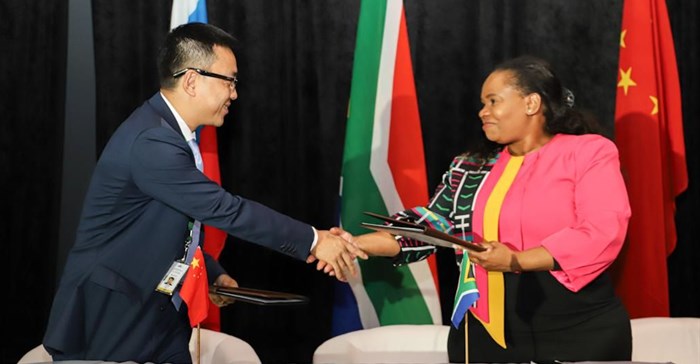
Top stories






More news


Marketing & Media
Ads are coming to AI. Does that really have to be such a bad thing?














Under the terms of the agreement, Huawei will share global best practices of the planning of digital economy policies and technology rollout.
Huawei’s wealth of technical expertise and global experience in digitisation and its application across the private and public sectors make the company well placed to take on an advisory as well as practical role in assisting South Africa reach its goals in respect of the BRICS ICT Development Agenda and Action Plan (DAAP), which forms the basis of the agreement, as well as the country’s own National Development Plan 2030.
Huawei will also support the DCDT in its broadband infrastructure development programme at the same time as giving practical assistance to SMEs in the country to build technical capacity especially on fibre broadband deployment.
On the skills development front, Huawei’s existing programmes including Seeds for the Future, 4IR Talent Development and its ICT academies are already contributing to local talent development which is part of the partnership.
“Huawei is committed to the youth of South Africa and the development of specific skills training that complements academic learning. It is important to equip young people to join the digital economy and to be employment ready, and our courses and programmes provide them with that opportunity,” said Huawei SA CEO Will Meng.
The collaboration between DCDT and Huawei on innovation – exploring new ICT technologies and how they can be applied to drive the digital economy forward – underpins the entire agreement.
South Africa has set itself a goal through its SA Connect programme which seeks to connect 80% of South Africans to the internet over the next 3 years.
Speaking at a BRICS B2B dinner after the signing of the partnership, DCDT deputy minister Philly Mapulane spoke of the group’s objective “to advance the B2B engagement agenda, particularly as it relates to placing SME development at the centre of ICT transformation in South Africa and within the BRICS in a growing digital economy”.
He said the B2B engagement had been a beneficial experience sharing exercise, “From India’s deployment of machine learning which reaches millions of Indians in different languages and dialects, to Huawei’s experience in deploying infrastructure to connect the unconnected, to Serpro’s Brazilian experience in connecting their citizens, and Russia’s articulation of the concept of digital sovereignty.”
“We live in a digital and hyper-connected world where technology continues to improve people’s lives and makes work easier for many sectors of the economy,” concluded Mapulane
Both Huawei and the DCDT are optimistic about the future of the country’s digital transformation process and the agreement will assist in ensuring that ICT technology drives the economy forward, taking every citizen with it.